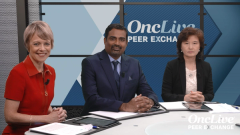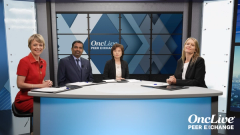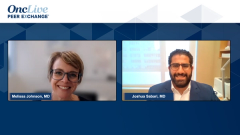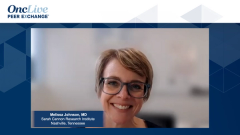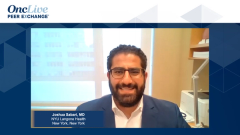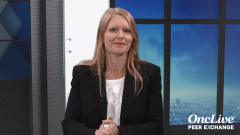
POSEIDON Study Post-hoc Analysis: Outcomes in Patients With KRAS/STK11/KEAP1 Mutations
A focused review of data from the POSEIDEN post-hoc analysis in patients with concomitant KRAS/STK11, or KRAS/KEAP1–mutated non–small cell lung cancer.
Episodes in this series

Transcript:
Joshua Sabari, MD: Dr Johnson, you presented exciting data at ESMO [European Society for Medical Oncology Congress 2022], and what I was particularly interested was the subsets of patients with STK11 and KEAP1 alterations. Tell me a little bit about that.
Melissa Johnson, MD: Thanks, Josh. It’s perhaps the newest kid on the block for the treatment of patients with newly diagnosed non–small cell lung cancer. The POSEIDON regimen [NCT03164616] was just approved for [patients with lung cancer who are treatment naïve]. Patients in the trial were randomly assigned to 1 of 3 arms: chemotherapy alone; chemotherapy with durvalumab [DURVA] followed by durvalumab maintenance; or chemotherapy, durvalumab, tremelimumab [TREME], and anti-CTLA4 inhibitor. In particular, the patients in that experimental arm got 4 doses of induction. We called it DURVA-TREME-chemotherapy. Then they got a fifth dose of tremelimumab at week 16. The sort of nutshell understanding that I have for POSEIDON is that it’s evaluating a limited course of tremelimumab, a limited course of CTLA4 in combination with what has now become the standard PD-L1 and chemotherapy. Josh is talking about the interesting, albeit retrospective analysis that Professor Peters [Solange Peters MD] presented at [World Conference on Lung Cancer], and then I presented an extension at ESMO 2022 showing that for patients with difficult-to-treat mutations, ie, patients with STK11 mutations, patients with KEAP1 alterations, and patients with KRAS mutations, these patients seemed to have a little bit of an edge when they received the DURVA-TREME-chemo versus DURVA-chemo or chemotherapy alone. In every case, the patients that got the CTLA4 added to the DURVA-TREME had a bit of a survival advantage, one that was durable over the nearly 4 years of follow-up that were available at the time that I presented the data.
Joshua Sabari, MD: I agree. Those data were quite impressive. More than a thousand patients enrolled in this study. You had sequencing data in this, again not preplanned, a subset analysis of more than 600 patients with high rates of KRAS alterations….Then you had patients with STK11 and KEAP1, and across all 3 of those groups, both in combination and separately, it appeared to benefit the addition of a CTLA4 inhibitor. Dr Johnson, how are you testing your patients for these alterations? Are these common or are you seeing these on a day-to-day basis?
Melissa Johnson, MD: That’s a good question. In the POSEIDON trial, 98% of patients with nonsquamous cancer who were included were valuable for this biomarker analysis, and that’s probably the highest of any of the frontline lung cancer trials that included biomarker data. The reason for that is because patients’ data were valuable if they had either tissue or plasma-based sample from which to do NGS [next generation sequencing] testing. All patients had to give an archive tumor sample, and about a third of the time that tissue will not be sufficient for NGS. Patients also had to give a blood sample on the day that they started treatment, and that was sent for NGS testing done in the plasma. This was in my mind, a very real-life situation where you had 2 shots on goal to get that NGS testing, that’s so important. That was the case for 98% of patients in the trial. That mirrors my clinical practice as well. I typically do both a tissue test to get PD-L1 and NGS testing if there’s enough. Then the first time that I meet a patient, I will also talk to them about a plasma sample. There is still a lot of confusion and concern about payer coverage for this NGS testing, but there are so many reasons why it’s important not to miss and guess the wrong way. We have noticed more payer support demanding that NGS testing be done before treatment can be applied. I think this will be a trend that we continue to see.
Transcript edited for clarity.


